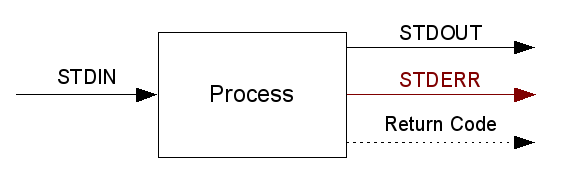Processes#
Let’s talk about processes from a shell point of view.

A process takes standard input (STDIN) and returns
standard output (STDOUT) - it gets printed on your console
standard error (STDERR) - you see that too if you don’t do
process 2> /dev/null, but more about that laterreturn code -
0on success, a different number otherwise
Of course there are processes that
do not read STDIN (but instead read files, get data from the kernel, …)
do not write to STDOUT (because they don’t have anything to say)
do not write to STDERR (because there are no errors)
But every process returns a return code.
There are environment variables too.
In the next sections I’ll show you how to use that knowledge with Bash and Python.
Bash#
I could not do better than the Advanced Bash Scripting Guide, so I will simply present a basic example. Just paste it line by line into your running shell.
#!/bin/bash
# environment variables
# =====================
var="hello world"
# STDIN, STDOUT
# =============
# echo takes a string and puts it on STDOUT
echo $var
# we can redirect STDIN to a file
echo $var 1> /tmp/some_file
# cat takes a file as first argument and writes it to STDOUT
cat /tmp/some_file
# to be brutally honest cat concatenates files and writes them to STDOUT
echo "part 2" > /tmp/some_other_file
cat /tmp/some_file /tmp/some_other_file
# cat can also take STDIN and write it to STDOUT
echo $var | cat
# to concatenate STDIN with a file:
echo $var | cat - /tmp/some_other_file
# STDERR
# ======
# let's redirect STDIN to STDERR
echo $var 1>&2
# we can read it, but if we redirect STDOUT to a file it remains empty
write_stuff_to_STDERR() { # this is a function -- see ``man bash``
echo "stuff" 1>&2
}
write_stuff_to_STDERR 1> /tmp/where_is_my_message
cat /tmp/where_is_my_message
# so to get to the message we redirect STDERR to a file
write_stuff_to_STDERR 2> /tmp/there_it_is
cat /tmp/there_it_is
# we can also redirect everything to a file
# that's basically everything you can read on your console
write_stuff() {
echo "INFO" 2>&1 # to STDOUT
echo "ERROR" 1>&2 # to STDERR
}
write_stuff > /tmp/everything
write_stuff 1> /tmp/just_stdout
write_stuff 2> /tmp/just_stderr
cat /tmp/everything
cat /tmp/just_stdout
cat /tmp/just_stderr
# if the output of a process is irrelevant
# we redirect to /dev/null (the bottomless bucket)
write_stuff 1> /dev/null # don't care about your info
write_stuff 2> /dev/null # don't care about your errors
# Return Codes
# ============
# on success processes return a 0
echo '' # this will definitely succeed
echo $?
# else they return something > 0
# good tools document this in their man pages
this_command_will_probably_not_be_found 2> /dev/null
echo $?
# return codes are useful for chaining processes
this_command_will_probably_not_be_found 2> /dev/null && echo 'success'
echo 'I work!' && echo 'success'
Python#
We know how to write stuff to STDIN and STDERR, how to set a return code and how to read STDOUT, STDERR and return codes. Let’s do that in Python!
Here is a process that can do all that:
#!/usr/bin/python
"""
Example about basic process manipulation
"""
import os
import sys
def read_stdin():
res = 'Your STDIN contains: '
for line in sys.stdin:
res = res + line
print res
def write_to_stdout():
print "Writing to STDOUT is easy."
sys.stdout.write('One way or another...\n')
def write_to_stderr():
sys.stderr.write('Writing to STDERR is easy too.\n')
def return_code():
sys.exit(8)
if __name__ == '__main__':
read_stdin()
write_to_stdout()
write_to_stderr()
return_code()
Use it like this:
echo 'spam' | ./processes.py
echo $?
But how do we communicate with other processes, i.e. be the one controlling others? Here’s an example:
#!/usr/bin/python
"""
Example about process communication
"""
import os
import sys
from subprocess import call, Popen, PIPE
def get_return_code():
cmd = ['echo', '""']
retcode = call(cmd)
print
print 'get_return_code'
print '==============='
print retcode
def get_stdout():
cmd = ['ls', '.']
p = Popen(cmd, stdout=PIPE)
res = p.communicate()[0]
print
print 'get_stdout'
print '=========='
print res
def run_in_shell():
cmd = "echo 'Shell makes life easy, but is not too powerful.' | cat -"
p = Popen(cmd, shell=True, stdout=PIPE)
res = p.communicate()[0]
print
print 'run_in_shell'
print '============'
print res
def get_stderr():
cmd = ['cat', 'some_filename_that_cannot_be_found']
p = Popen(cmd, stderr=PIPE)
res = p.communicate()[1]
print
print 'get_stderr'
print '=========='
print res
def get_everything():
cmd = "echo 'first part works' | cat - but_this_file_cannot_be_found"
p = Popen(cmd, shell=True, stdout=PIPE, stderr=PIPE)
out, err = p.communicate()
retcode = p.returncode
print
print 'get_stdout_and_stderr'
print '============'
print 'STDOUT: %s'%out
print 'STDERR: %s'%err
print 'returncode: %s'%retcode
if __name__ == '__main__':
get_return_code()
get_stdout()
run_in_shell()
get_stderr()
get_everything()
You can find more information in the official Python Documentation.
